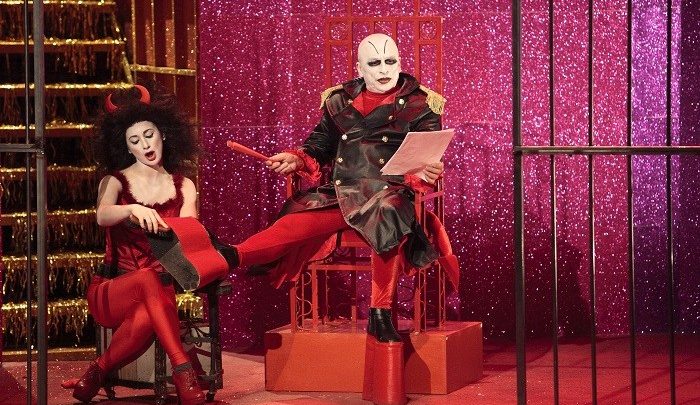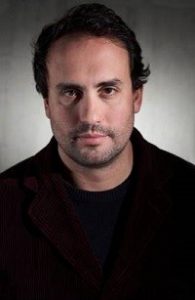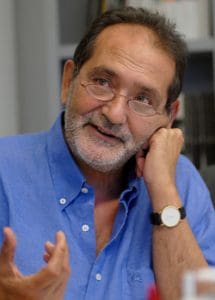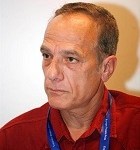
“Many festivals are mostly a brand”: Interview with Rodrigo Francisco
Savas Patsalidis in Critical Stages/Scènes critiques, jul 2018 notícia online

Rodrigo Francisco graduated with a BA in Modern Languages and Literatures from Universidade de Lisboa. He started writing for the stage with Quarto minguante (2007), a play that was adapted for television and translated into Spanish for Primer Acto, and into French for Éditions l’Oeil du Prince. His second play, Tuning (2010), was nominated by SPA (Portuguese Authors Society) for Best Portuguese Play the year it premiered.
He had his theatrical training under the late and celebrated Portuguese director Joaquim Benite, whom he assisted in productions of Molière, Saramago, Bernhard, Brecht, Shakespeare, O’Neill, Feydeau; as well as in the operas The Clemency of Titus, by Wolfgang Amadeus Mozart, O doido e a morte, by Alexandre Delgado, and A rainha louca.
He directed Falar verdade a mentir (2011), by Almeida Garrett, La ronde (2012), by Arthur Schnitzler, Glengarry Glen Ross (2013), by David Mamet, Um dia os réus serão vocês: o julgamento de Álvaro Cunhal (2013), a text that adapts the trancripts of Cunhal’s trial in 1950 (from an original idea by Joaquim Benite) and Em direcção aos céus (2013), by Ödön von Horváth. In 2014, he directed Kilimanjaro, created from various short stories written by Ernest Hemingway. He also directed texts by Vsevolod Vichnievski, Romeu Correia, Matej Visniec and Gothold Ephraim Lessing. He is the second artistic director (succeeding Benite) of Companhia de Teatro de Almada and the Festival de Almada, which was founded in 1984 and has since taken place every year in July. Despite having started as a display of amateur theatre groups, as early asits second edition the programme began including professional Portuguese companies and, in 1987, the first steps towards internationalization were taken, with foreign companies connected to college theatre.
In spite of the unfavourable conditions that the Festival had to face in the beginning (namely, tight budgets, a shortage of technical and logistic means, its location in a peripheral city with no tradition of artistic festivals), the Almada Festival asserted itself among European theatre festivals. It became renowned for discovering new shows and companies (indeed, the Festival provided some of them with their first opportunity to show their work to a wider audience) and for the quality of its programming. The Festival is known for bringing together diverse theatrical aesthetics, all of which are connected by their professionalism and the quality of their production.
The fact that the Festival has established itself both as an international programme and an important showcase for Portuguese work has made it a very significant player in terms of the promotion of Portugal’s national theatre around the world. Many international media have sent their correspondents to Festival de Almada, including: El Mundo, El País, ABC, Primer Acto, Artez, L’Humanité, Sipario, The Guardian, The Times, the Sunday Herald (Scotland), Politis, BBC, TVE, and Critical Stages.
In order to meet the constant increase in its audience, Festival de Almada has expanded its operations across the Tagus River into Lisbon. From Beco dos Tanoeiros, a tiny street in the old part of Almada, its first expansion brought in three more venues in Almada, namely: Pátio Prior do Crato, the SMAS’ Square and Casa da Cerca. Then, in 1992, Escola D. António da Costa, in Almada, became the emblematic centre of the Festival; becoming simultaneously the space where the Palco Grande (Main Stage) is located and where the esplanade became a place for meetings and debates, film projections and artistic and documentary exhibitions. In 1997, with the collaboration of Teatro da Trindade, the Festival spread to the stages of Lisbon for the first time. Two years later Centro Cultural de Belém, also in Lisbon, also began its collaboration with the Festival. Other spaces in Lisbon followed, such as Teatro Nacional D. Maria II, Culturgest, São Luiz Teatro Municipal, Maria Matos Teatro Municipal, Teatro da Politécnica and Teatro do Bairro.

Beyond the theatre programme, every year there is a parallel programme of music, street shows, debates, international seminars, exhibitions, and artistic and technical workshops. In its most recent editions, Festival de Almada has presented prestigious international theatre companies, as well as shows created by some of the top directors in the world, such as Giorgio Strehler, Luca Ronconi, Peter Brook, Dario Fo, Peter Stein, Luc Bondy, Declan Donnelan, Katie Mitchell, Matthias Langhoff, Bruno Ganz, Corin Redgrave, Steven Berkoff, Joël Pommerat, Thomas Ostermeier, Alain Ollivier, Bernard Sobel, Christoph Marthaler, Falk Richter or groups like the tg STAN, Els Joglars, 1923, Peeping Tom, among many others.
Joaquim Benite was the founder and artistic director of Festival de Almada until he passed away in 2012. Rodrigo Francisco, who was his staging assistant since 2006, succeeded him as artistic director of both Companhia de Teatro de Almada and Festival de Almada.
Mr Francisco, you come from a younger generation of directors. You’ve been trusted with an important international festival. Do you think that your festival has a mission to reach the people, to cultivate their taste, to challenge what they know, to offer what they do not know (in other words, to offer cutting-edge shows)? If so, how do you achieve all these?
The Festival de Almada started in 1984, as an amateur theatre event. The Almada theatre company, Companhia de Teatro de Almada, under the direction of Joaquim Benite, used to support local amateur theatremakers, at schools and cultural associations. So, Benite had the idea of showing the plays performed by those groups. In the second edition, there were already professional companies participating. At the end of the nineties Festival de Almada started presenting, in collaboration with major theatres of the Lisbon area, some of the world’s most renowned theatre companies and creators, such as Peter Brook or the Piccolo Teatro di Milano.
In those times, Festival de Almada was one of the few events that provided the Portuguese with some idea of what was going on international stages. Nowadays, I think the Almada Festival has to be understood as a vehicle that strengthens the relationship between the theatre company that organizes it and its audience. Between 4–18 July, our audience has the opportunity to see (and compare) our work with the aesthetics and techniques of the international companies that visit us. The Festival is also a good opportunity for the Portuguese companies to show their work to foreign critics that come to Almada.
Has the Almada Festival boosted or inspired the development of local theatre? Have things changed in the area since the foundation of the festival? If so, in what ways?
When our company moved from Lisbon to Almada in 1978 (in the frame of the theatre decentralization movement), the latter had barely any theatre tradition. Almada was a working-class district. Nowadays, this town of 170,000 inhabitants has five theatre venues, as well as more than twenty amateur theatre projects, besides the Joaquim Benite Municipal Theatre, which is where our company is based. So, yes, I think we can say that the activity of our Festival, together with the work developed all year round by our company, has encouraged the growth of Almada’s theatre scene .
What is the percentage of local productions in each edition?
Normally, half of the shows in each edition are Portuguese. Our company too, always presents a play, usually a premiere.
Does the Festival also sponsor productions? If so, how many per edition?
We cannot afford the production of shows. But since Companhia de Teatro de Almada is the organizer of the Festival, and we normally present a premiere during the Festival, we can say we also produce new plays. Nevertheless, the Portuguese companies normally do prepare (since our Festival always takes place between 4–18 July) a new creation to present during the Festival. During recent editions we have had up to five premieres each year.
Which were the greatest box office hits of the last few editions? I am asking you this question in order to see whether it is possible to understand people’s taste.
Our Festival uses the system of “subscriptions,” which means that most of the audience buys a full-pass to watch all the shows. Of course, we also sell single tickets. I think some of the last box office hits were The Seagull, directed by Thomas Ostermeier; Une île flotante, by Marthaler; and Pinocchio, by Joël Pommerat.
Allow me to open up our conversation and reflect on what is happening around the world. My question is this: Why do you think we have this immense proliferation of festivals around the world? Is this proliferation the result of artistic needs or the result of globalization and economics? Or is it a kind of competition among cities: each city trying to boost its brand? Or a little bit of everything?
When we started, there were few festivals in Portugal. Nowadays, you have hundreds—from music to gastronomy! Our festival follows somewhat the tradition of post-Second World War European art festivals, inspired by a spirit of dialogue between those nations and cultures which had been in conflict. Joaquim Benite, founder of the Festival de Almada, was inspired by Jean Vilar’s Festival d’Avignon.
Nowadays, many festivals are mostly a brand, and are more concerned with economic aspects (such as tourism, for example) than with artistic matters. Politicians, too, use these kinds of events to promote their cities (and themselves). I do not know how many of these new festivals will prevail (I hope many of them, especially in the theatre area).What I do know is that our Festival celebrates its 35th edition in 2018, and that it will remain committed to its love of theatre and the arts.
What kind of theatre do Festivals prefer? Is there any trend now that dominates in the festival circuit?
There is a new kind of work, (which has appeared in the last ten years, I think) which the Croatian director Ivica Buljan calls “Benetton shows.” These plays are like the famous brand stores of that brand: they look the same in Madrid, Athens, London, Rome or Lisbon. They are made to sell abroad, targeting people who need to look alike, to look like everybody. It’s quite easy to identify this kind of productions: young people on stage dressed in a hipster way, no set, few words (mostly in English), lots of video and having important matters staged in a quite superficial way. They address topical issues, such as: What is Europe?; What do we do with the refugees?; Let’s fight capitalism!; or Let’s save the world (not polluting it).
Do you think Festivals, by inviting more or less the same companies that travel, or by showing a preference for companies that do documentary theatre or devised and, generally, metadramatic work, promote an aesthetic homogeneity rather than heterogeneity? What do you think? Is that a good thing?
What I observe is that major festivals tend to look at creators from “outsider” regions as if they are “documentary theatre objects of study.” What I mean is this: if you are Portuguese, you are accepted in France if you talk about “fado,” or the Portuguese dictatorship of the last century, or the relationship of your country with its former colonies. I do not think, for example, that French, or English, or German festivals (and their audiences) would care about the way you stage Molière, or Shakespeare, or Schiller. I believe the tendency is, if you are South-American you should talk about dictatorship and violence; if you’re African, you should talk about colonialism; and if you are Greek or Italian you should talk about refugees. But there is no reason why an African or Asian should not play Shakespeare better than an American or an English theatremaker, for instance.
This is true. I feel that strongly when it comes to Greek theatre productions. In addition to what you just said, festivals tend to invite productions that rely more on the image than the word. Do you think that productions that are more verbal and, also, productions that deal with local matters can easily attract festival administrators and curators?
In Almada, we have a tradition: on the last day, the audience votes on which production will be staged again the next year as the “Show of Honor.” Two years ago, the audience voted for a five-hour monologue; a documentary theatre production based on the Portuguese socialist revolution. It had no image, besides a single actress on stage, with some documents. I think we cannot make general assessments on the taste of the audiences. Each festival is a festival of its own kind. And each audience is an audience of its own kind.
Festivals have become very expensive events to maintain. It is impossible to break even at the box office. Does that have any impact on the way they are managed/marketed? And what about your Festival? How do you manage? Do you get enough support from the State to realize your artistic plans?
We recently received the news that the Portuguese government is preparing to cut €110,000 from this year’s edition of our Festival. The Portuguese theatre scene is shocked. We hope to reverse this decision soon, with the help of the audience and of the political institutions.
If you had lots of millions would you run Almada Festival differently?
No matter what the budget of the Festival de Almada will be at present or in the future, there are some values that will be maintained, and which already existed at the time of its first editions: the respect for the audience, the love for art and the pleasure of reflection.
Given the political, economic and cultural situation that prevails in the world, do you think theatre still has the power to change things, to be a front runner?
I think theatre does not make revolutions: the power to change our destinies is in our own hands. What I do think is that theatre can constitute a forum for the debate of ideas, as well as a privileged place to experience poetry. That is what makes us different from other animals: the capacity of creating our own dreams.
What’s your next step?
To surpass the difficulties due to the lack of public funding, and to present our audience the best Festival de Almada ever.

*Savas Patsalidis is Professor of Theatre and Performance History and Theory in the School of English (Aristotle University), the Hellenic Open University and the Drama Academy of the National Theatre of Northern Greece. He is the author of thirteen books on theatre and performance criticism/theory and co-editor of another thirteen. His two-volume study, Theatre, Society, Nation (2010), was awarded first prize for best theatre study of the year. In addition to his academic activities, he works as a theatre reviewer for the ejournals lavart, parallaxi, and the greekplay project. He is currently the president of the Hellenic Association of Theatre and Performing Arts Critics and the editor-in-chief of Critical Stages/Scènes Critiques, the journal of the International Association of Theatre Critics (IATC).